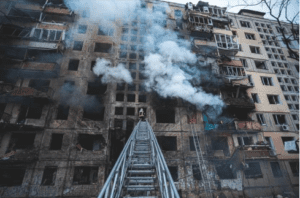
Losses among civilians from February 24, when Russia started the war against Ukraine, until 24:00 on April 4 amounted to 3675 civilians (in the report the day before – 3527), including 1480 dead (1430), reports the Office of the UN High Commissioner for Human Rights on Tuesday.
“OHCHR believes that the actual figures are much higher as information is delayed from some areas of intense fighting and many reports are still awaiting confirmation,” the document says.
According to him, this applies, for example, to Mariupol and Volnovakha (Donetsk region), Izyum (Kharkiv region), Popasnaya (Luhansk region), Borodyanka (Kyiv region), where there are reports of numerous civilian casualties. They are subject to further verification and are not included in the above statistics.
“The majority of civilian deaths or injuries were caused by the use of explosive devices with a wide area of effect, including shelling from heavy artillery and multiple launch rocket systems, as well as rocket and air strikes,” the report says.
According to confirmed UN data, 331 men, 211 women, 40 boys and 22 girls died, while the sex of 61 children and 815 adults has not yet been determined.
Among the 2,195 injured, 43 are girls and 40 boys, as well as 100 children, whose sex has not yet been determined.
Compared to the previous day, two children were killed and five injured, according to the UN.
OHCHR indicates that in Donetsk and Luhansk regions, as of midnight April 5, there were 407 (405) dead and 808 (793) injured in government-controlled territory, and 67 (67) dead and 257 (253) injured in territory controlled by self-proclaimed “republics”.
In other regions of Ukraine under government control (in Kyiv, as well as in Zhytomyr, Zaporozhye, Kiev, Sumy, Odessa, Mykolaiv, Kharkiv, Kherson, Dnepropetrovsk, Cherkasy and Chernihiv regions), the UN recorded 1006 (958) dead and 1130 (1051) injured .
The report also states that, according to the Office of the Prosecutor General of Ukraine, as of 08:00 on April 5, 165 (161) children were killed and 266 (264) were injured.
The increase in indicators in this report compared to the figures in the previous report should not be attributed only to new cases that occurred on April 4, since during the day OHCHR also verified a number of cases that occurred in previous days, the document specifies.
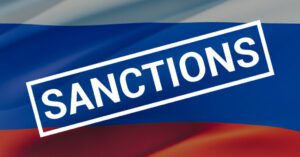
The President of the European Commission (EC), Ursula von der Leyen, announced on Tuesday proposals for new sanctions of the EU’s fifth package against Russia.
“The ban on coal imports from Russia worth 4 billion euros per year, which cuts another important source of income for Russia. A complete ban on transactions with four key Russian banks, including VTB, the second largest Russian bank,” the report said. statement of the head of the EC, published on Twitter.
BAN, BANKS, EU, IMPORT, RUSSIAN COAL, SANCTIONS, TRANSACTIONS
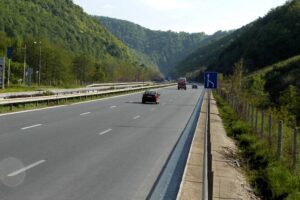
The fare on the roads of Bulgaria is not charged for any car with a Ukrainian registration number (electronic vignette for cars weighing up to 3.5 tons and a tariff for trucks and buses over 3.5 tons) when using the national road network, according to the Motorny website ( Transport) Insurance Bureau of Ukraine (MTSBU).
The corresponding decision adopted by the Council of Ministers of Bulgaria came into force on February 24, 2022 and will be valid until the need for humanitarian and medical assistance is eliminated.
All violations in the electronic system of vehicles generated for cars with Ukrainian registration after February 24, 2022 are closed. Thus, cars with Ukrainian registration can freely leave the territory of Bulgaria even if they violate traffic rules.
The National Service (BGTOLL) has a customer service hotline that operates daily from 8:00 am to 10:00 pm. By calling 0700 10 876 or by e-mail info@bgtoll.bg all persons, including Ukrainians, can receive the necessary information.
The report also notes that in Poland, travel on toll roads for cars with Ukrainian numbers is also now free. In Slovakia, cars from Ukraine can move without purchasing an online vignette. In Germany, the autobahns are free for all cars.
Dynamics of changes in population of ukraine from 1991-2022

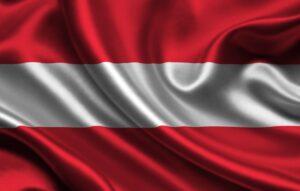
Austrian Chancellor Karl Nehammer said he would visit Ukraine to get an idea of the situation on the ground and talk about further assistance.
“I spoke with President of Ukraine Volodymyr Zelensky by phone yesterday. We discussed that I would go to Ukraine to get an idea of the situation on the ground and talk about further assistance,” Nehammer tweeted on Tuesday.
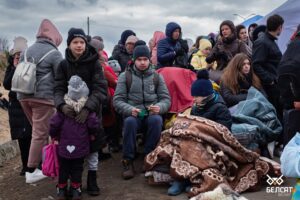
The task of the European Union is to protect children who are fleeing the war that Russia unleashed against Ukraine and to keep them from becoming the object of human trafficking.
As Vice-President of the European Commission for Democracy and Demography Dubravka Szuica said on Tuesday in Strasbourg, speaking at the plenary session of the European Parliament, about 2.5 million children in Ukraine were forced to leave their homes, about 2 million children crossed the border with the EU, many of them arrived without parents. “Our priority is to urgently respond to their needs … Legal guardians must be appointed as soon as possible, potential foster families confirmed, so that children do not end up in homes where violence is used,” she said.
Schuitz called education a key task. “Member States help children go to school to return to normal life, the integration system, together with social, psychological assistance, cultural and sports activities, will help overcome trauma, cultural and language barriers,” the Vice President of the European Commission detailed.
Ylva Johansson, European Commissioner for Home Affairs, also said that many of these children face a new danger – the danger of human trafficking. “Lithuanian authorities are investigating the possible trafficking of 43 children for adoption. There are no confirmed cases yet, but we know from bitter experience that the danger is real. Children are at the very top of our agenda. Our goal is to protect children from the war zone by providing them with safe homes,” the Commissioner said.
According to her, working on the prevention of human trafficking, starting with crossing the EU border, where 282 Frontex employees help identify people who are at risk of trafficking, and Europol collects data, coordinates police cooperation, monitors the online activities of potential traffickers. “Europol has set up a dedicated anti-trafficking unit, working with the police in Ukraine and the EU countries bordering Ukraine. Many Member States have been warned of the danger. Our priority right now is registration, registration, registration. We need to know where these children are – all 2 million. Not a single child can be lost,” Johansson stressed.
“Our main challenge is still before us – how long this war will continue, there will always be a risk for children. Imagine that you are a Ukrainian mother with three children and have to make a very difficult decision – stay here with the children in danger or send them with your friend who will soon go with his two children on a potentially also dangerous journey to the EU and know that there is a risk that this may be the last time you see your children. Many parents have been forced to make this difficult decision. And they want us to keep their children safe. They are counting on us. Let’s show that they can rely on us,” she concluded her speech.